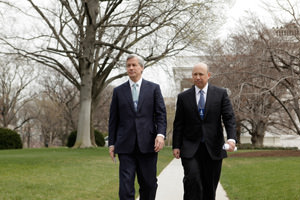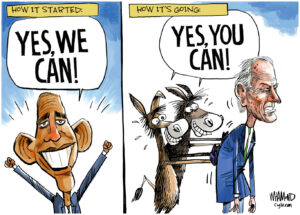Obama’s Friends in Low Places
If you still require to be disabused of Obama’s pretend populism, consider his close ties to Wall Street's more rotten executives.
That Barack Obama is such a kidder. No matter how awkward the moment, he’s got just the right quip to purchase some wiggle room. Remember when his old Chicago banking buddy Jamie Dimon, the CEO of JPMorgan Chase, first ran into that bit of trouble over his bank’s “London Whale” derivative scam? That scheme has already lost $6 billion with close to $1 billion more piled on by the SEC in fines last week after JPMorgan admitted it broke the law.
Well of course, being Obama, when the scandal first broke last year, the president picked a women’s daytime talk show, ABC’s “The View,” to deal with the scams of his leading Wall Street backer. “JPMorgan is one of the best-managed banks there is,” he told the “View” audience. “Jamie Dimon, the head of it, is one of the smartest bankers we got, and they still lost $2 billion and counting.”
Yes, counting; that $2 billion is now likely to end up around $16 billion given the future legal fees and possible payouts allotted to countering the myriad lawsuits connected with this admission of illegal activity. That’s aside from the mortgage fraud, Libor rate rigging and energy manipulation cases still confronting the beleaguered bank. Thursday, on the same day that Dimon’s bank got slapped with the SEC fine, federal regulators revealed that JPMorgan had agreed to pay $389 million in penalties and refunds to compensate for a credit card identity theft protection scam after $309 million already paid out in that case.
It should be remembered that this same Dimon, who appeared before a Senate committee wearing presidential cufflinks, once worked with Sanford Weill in engineering the reversal of the Glass-Steagall law to make Citigroup, a previously illegal merger of investment and commercial banks, possible. But despite his record as a leader in the radical deregulation of banking that caused all of the trouble, Obama turned to Dimon for direction on fixing the economy.
If you still require to be disabused of Obama’s pretend populism, consider his decision to select William M. Daley, JPMorgan’s representative in Washington, to be his White House chief of staff. It gave Dimon the key White House connection to accompany the passkey he already had at Treasury with his pal Timothy Geithner as secretary.
It was a real cozy arrangement; Dimon was still a governor of the New York Federal Reserve Bank, where he had served during Geithner’s presidency overseeing the banking meltdown. Geithner had been instrumental in arranging Fed financing for JPMorgan’s acquisition of troubled Bear Stearns through a $55 billion loan and later an additional $25 billion in TARP funds.
Once appointed Treasury secretary, Geithner made himself very accessible to Dimon. As an Associated Press investigation reported, Dimon had numerous personal meetings and phone calls with Geithner while the White House was calibrating its response to the Wall Street crisis.
Why are we not surprised that Obama has done nothing to break up the too-big-to-fail banks, the biggest now being Dimon’s? Don’t be fooled by the occasional fines; the banks have used the interest-free money to grow ever larger and more unaccountable in their behavior.
Even the recent SEC settlement, while mentioning the despicable behavior of JPMorgan’s chief executive, fails to utter Dimon’s name, and as Sen. Carl Levin, D-Mich., who did much to unravel this scam, noted, “the whole issue of misinforming investors and the public is conspicuously absent from the SEC findings and settlement.”
After the SEC condemnation of JPMorgan’s “egregious breakdowns in controls” and conclusion that “senior management broke a cardinal rule of corporate management” to honestly inform the board of directors, top senior manager Dimon made all the right noises. JPMorgan announced that $4 billion and a staff of 5,000 employees would be devoted to compliance with the law.
This was just the sort of commitment Dimon made in 2006 when he hired Stephen M. Cutler, who had been head of the SEC Division of Enforcement, to be JPMorgan’s general counsel. Once a committed regulator who urged corporations “to create a culture of compliance,” Cutler clearly drank the Kool-Aid at JPMorgan, for he was in charge of legal and compliance activities worldwide at the time of the London Whale fiasco. So much for trusting corporate compliance.
As Donald Langevoort, an expert on compliance issues at Georgetown University School of Law, told The New York Times on Friday, “JPMorgan is by no means unique. None of these big banks really want compliance people causing traders and investment bankers to second-guess themselves too much because that gets in the way of making money. No one will say this, but it’s more effective to run the risk of noncompliance and pay a few fines, which is just a cost of doing business.”
Exactly the reason that too-big-to-fail banks can’t be trusted to do the right thing and why Obama shouldn’t have been guided by Dimon in the first place.
Your support is crucial…With an uncertain future and a new administration casting doubt on press freedoms, the danger is clear: The truth is at risk.
Now is the time to give. Your tax-deductible support allows us to dig deeper, delivering fearless investigative reporting and analysis that exposes what’s really happening — without compromise.
Stand with our courageous journalists. Donate today to protect a free press, uphold democracy and unearth untold stories.









You need to be a supporter to comment.
There are currently no responses to this article.
Be the first to respond.